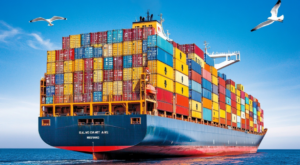Hiring a recognized logistics partner is not just about transportation and delivery—it’s about leveraging expertise, technology, and a global network to optimize supply chain performance, reduce costs, and ensure regulatory compliance. Businesses that invest in a reputable logistics partner gain a competitive edge in international markets.
This article explores the key benefits of hiring a recognized logistics partner, providing detailed explanations, real-life examples, and case studies to illustrate how businesses can maximize efficiency and profitability through strategic logistics partnerships.
The Value of Hiring a Recognized Logistics Partner
Expertise in Customs Documentation and Regulatory Compliance
One of the most complex aspects of international trade is dealing with customs documentation and regulatory requirements. Different countries have varying trade regulations, tax structures, and duty requirements, making it essential for businesses to stay updated on compliance policies. However, navigating these regulations on your own can be time-consuming and prone to errors that result in costly delays or penalties.
A recognized logistics partner provides expertise in customs documentation and compliance, ensuring shipments meet all legal requirements. They help businesses with:
- Accurate and Timely Documentation: Ensuring that invoices, bills of lading, certificates of origin, and inspection reports are correctly prepared and submitted on time.
- Tariff Classification and Duty Optimization: Assisting businesses in classifying goods under the correct tariff codes to minimize customs duties and taxes.
- Adhering to Industry-Specific Regulations: Many industries, such as pharmaceuticals, food, and electronics, have specific import-export regulations. Logistics firms ensure compliance with these regulations to prevent shipment holds or rejections.
Case Study: Reducing Customs Delays for an Electronics Manufacturer
An international electronics manufacturer expanding into South American markets faced repeated customs delays due to incorrect documentation. By partnering with a recognized logistics provider, they streamlined the customs declaration process, ensured precise paperwork, and reduced customs clearance time by 35%. As a result, they improved their on-time delivery rate and reduced warehousing costs.
Regulatory Expertise to Navigate Changing Trade Laws
International trade regulations frequently change due to shifts in policies, trade agreements, and geopolitical issues. For businesses without a dedicated compliance team, adapting to these regulatory shifts can be difficult. Logistics partners actively monitor changes in laws and ensure that businesses remain compliant while minimizing disruptions.
For example, Brexit significantly altered trade regulations between the UK and the EU. Many businesses struggled with new tariffs, customs procedures, and border delays. Logistics companies specializing in UK-EU trade quickly adapted to the new landscape, ensuring that their clients’ shipments flowed smoothly with minimal interruptions.
Freight Cost Savings and Competitive Shipping Rates
Logistics costs, particularly freight expenses, represent a significant portion of overall business expenditures in international trade. Finding affordable yet reliable shipping solutions is a major challenge for businesses. A recognized logistics partner can help reduce these costs in several ways:
- Negotiating Bulk Shipping Rates: Logistics providers handle high cargo volumes, allowing them to negotiate lower freight rates with carriers.
- Route Optimization: They analyze shipping routes to minimize transit times and reduce fuel and transportation expenses.
- Consolidated Shipments: For businesses shipping smaller consignments, logistics firms offer freight consolidation—grouping multiple shipments together—to reduce costs.
- Reducing Demurrage and Storage Fees: Efficient logistics management minimizes unexpected warehouse storage fees and demurrage charges that arise due to customs delays or poor planning.
Example: Cost Reduction for an E-Commerce Retailer
A Singapore-based e-commerce business dealing in fashion and accessories expanded into Europe but faced high shipping costs and supply chain inefficiencies. By working with a recognized logistics partner, they benefited from bulk shipping discounts, improved transit times, and warehousing optimization, reducing logistics costs by 18% within six months.
Supply Chain Optimization and Increased Efficiency
Advanced Technology and Real-Time Tracking
Modern logistics partners leverage cutting-edge technology to enhance supply chain efficiency. One critical feature businesses benefit from is real-time shipment tracking. With IoT-enabled devices and GPS tracking, businesses gain visibility into their shipments, allowing them to monitor estimated delivery times and mitigate potential delays.
Example: An automobile parts supplier switched to a logistics partner offering AI-driven tracking solutions. They were able to preemptively adjust delivery schedules and prevent supply shortages, improving production line efficiency by 22%.
In addition to tracking, advanced logistics solutions also include inventory management systems, automated warehouse operations, and data analytics to forecast demand and optimize stock levels.
Reducing Lead Times and Improving Customer Satisfaction
Efficient supply chain management directly correlates with improved customer satisfaction. When businesses can ensure fast and reliable product deliveries, they enhance customer loyalty and retention. Logistics firms help businesses:
- Reduce lead times by optimizing route planning and selecting quicker transportation methods.
- Offer flexible delivery solutions like multi-modal transportation (air, sea, road, rail) based on urgency and cost-effectiveness.
- Minimize stockouts and overstock situations through intelligent inventory planning.
Case Study: Streamlining Deliveries for a Luxury Brand
A luxury watch brand serving customers worldwide faced stock inconsistencies among regional distribution centers. A recognized logistics provider helped integrate smart inventory management and tech-driven demand forecasting, reducing delayed deliveries by 30% while cutting excess stock costs.
Risk Management and Business Continuity
Proactive Risk Mitigation Strategies
International trade involves numerous risks, including unforeseen logistical disruptions, natural disasters, political instability, and supplier failures. A recognized logistics partner implements risk management strategies to prevent and mitigate supply chain bottlenecks.
- Diversifying Shipping Routes: Logistics firms suggest alternative carrier options and rerouting strategies in case of supply chain disruptions.
- Contingency Planning: Businesses benefit from contingency stock arrangements in regional warehouses to prevent stockouts.
- Insurance Coverage: Logistics providers help businesses secure adequate cargo insurance to protect against losses from damaged or delayed shipments.
Example: Managing Supply Chain Disruptions During the Pandemic
The COVID-19 pandemic severely impacted global supply chains. Businesses with logistics partners had an advantage in overcoming transportation shutdowns by leveraging multimodal shipping strategies, warehousing solutions, and alternative sourcing options. A case study on pharmaceuticals showed that companies aligned with logistics firms maintained a 90% fulfillment rate despite pandemic-related disruptions.
Sustainability and Environmental Responsibility in Logistics
Green Logistics and Reduced Environmental Impact
Sustainability is becoming increasingly crucial in international trade, with businesses prioritizing eco-friendly supply chains. Recognized logistics providers play a significant role in reducing carbon footprints by implementing:
- Fuel-Efficient Transportation Modes: Promoting the use of electric, hybrid, and fuel-efficient vehicles.
- Carbon Offsetting Programs: Some logistics providers invest in projects that reduce carbon emissions to offset their environmental impact.
- Eco-Friendly Packaging Solutions: Encouraging reusable packaging materials and sustainable alternatives.
Example: A Global Beverage Brand’s Sustainability Improvements
A global beverage company partnered with an environmentally conscious logistics provider, reducing carbon emissions by 25% through optimized transportation routes and converting 40% of shipments to rail transport instead of trucks.
Conclusion
In today’s competitive global trade landscape, hiring a recognized logistics partner is a strategic decision that can elevate business success…




